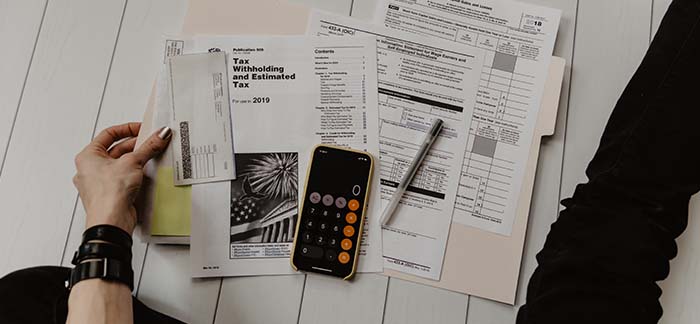Life Insurance in Estate Planning


Is life insurance good for estate planning?
Estate planning is a financial strategy that prepares an individual to pass on his or her wealth and possessions to loved ones or next of kin. There are many aspects of estate planning with steps that occur at different stages of your life. Life insurance is just one financial tool to include in your estate plan.
Life insurance is a valuable asset for those who want to provide easy-to-access cash upon their death. Whether this cash is for estate taxes, business uses, inheritance, or philanthropy. Due to its tax-advantages and strategic opportunities, life insurance is a versatile tool.
What type of life insurance is best for estate planning?
There are two main types of life insurance: term life insurance and permanent life insurance.
As the names suggest, term life insurance is temporary and provides coverage for a specific term. Permanent life insurance provides coverage your entire life.
Term life insurance can work if you have future financial plans laid out and you need coverage in the meantime. For example, if you’re a business owner and have a buy-out exit strategy that takes place in ten years, then you may decide to buy a 10-year term life insurance policy as part of your estate plan.
However, in most cases, a permanent life insurance policy is going to be your best option for an estate plan. Afterall, estate planning is the process of managing your estate when you die.
If your life insurance doesn’t last until your last day of life, then it’s not much use if the life insurance is mainly for estate purposes. Permanent life insurance is designed to last your lifetime.
» Learn more: Term vs Whole Life Insurance
Our life insurance calculator helps
you determine how much you need
Explore your options in under 5 minutes.
How does life insurance work in estate planning?
An estate plan is essential for anyone, no matter the size of your estate.
The main purpose of an estate plan is to ensure your legal, financial, and medical affairs are in order before you die so your loved ones don’t struggle attempting to manage everything during their grief.
A well-designed estate plan can help you:
- Minimize or eliminate estate taxes,
- Provide for orderly family business succession,
- Plan for incapacity,
- Avoid probate and probate fees,
- Promote a charitable cause,
- Minimize family discord,
- Arrange for the guardianship of your minor children,
- Preserve wealth throughout generations,
- Protect assets from creditors, divorces, and lawsuits,
- Provide for loved ones with special needs while preserving eligibility for government-sponsored programs.
There are several advantages to using life insurance in your estate plan because of the unique nature of life insurance:
- The death proceeds are available immediately when needed.
- The death proceeds are usually received free of federal income tax.
- The policy can be arranged to avoid probate costs.
- Liquidation of estate assets, perhaps at sacrifice prices, can be avoided.
- Needing to borrow cash that requires interest payments is also avoided, including paying the federal estate tax in installments.
- The policy will return more in death proceeds than was paid in premiums, allowing estate costs to be funded at a discount.
- For individuals whose estates will be subject to federal estate tax, the life insurance can be arranged to avoid inclusion in the gross estate.
Life insurance is often one of the largest assets a person owns. Unlike many other assets, such as a house or business, life insurance can be kept out of your taxable estate and the death benefits rarely go through the probate process.
How can life insurance proceeds avoid probate?
Probate courts cover matters such as the settlement of estates, appointing guardianships, and will validation and resolution. Most property goes through probate before being distributed to beneficiaries and heirs.
Probate records are public. The probate process can cost a lot of money. The process can take a long time, postponing when beneficiaries get access to inherited assets. These are some reasons why most people prefer to avoid probate.
Life insurance is one such asset that can avoid probate in most cases.
When you purchase life insurance, you name beneficiaries of the death benefit. As long as your primary or contingent beneficiaries are still alive when you die, the proceeds will not be probated.
Naming specific beneficiaries also ensures that any creditors you may have will not be able to collect from the life insurance.
Your beneficiaries get the proceeds quickly, unlike probated assets since this process takes time.
Do not name your estate as the beneficiary of your life insurance policy. Doing so will cause it to need to go through probate and it’s added to your estate for tax purposes. Although the estate tax exemption threshold is very high (currently $11.7 million per individual in 2020), a life insurance policy can be the asset to tip you over the edge.
There are four basic instances when life insurance is included in your estate upon death:
- If it is payable to your (the insured’s) estate;
- If you possess incidents of ownership in the policy at the time of death;
- If you transfer incidents of ownership by gift within 3 years of death;
- If life insurance is placed in a trust that is required to pay for the estate’s costs.
If you avoid these situations, the life insurance proceeds will not be subject to estate taxes.
Want to see what you’d pay for life insurance?
Compare the best prices from the names you know and trust, all in one place.
How does life insurance work in trusts?
When using life insurance for estate purposes, the use of trusts can be highly beneficial. There are many different types of trusts, but overall, a trust is a legal agreement that transfers property or assets from one person to another person who will hold and manage the property on behalf of named beneficiaries.
Special Needs Trusts
If you’re caring for someone with special needs, you need to be careful not to make them ineligible for government benefits. Any assets in their name totalling over $2000 would disqualify them from many federal and state assistance programs, such as Social Security and Medicaid.
A special needs trust can be the beneficiary of a life insurance policy. After your death, the death benefit proceeds will be used by the trustee to make distributions to support the special needs individual and contribute to his or her quality of life.
The assets pass free of gift, estate, and income taxes, so a larger amount will be available for the welfare of the beneficiary. And because the assets are not owned by your special needs loved one, the funds will not jeopardize the individual’s government benefit eligibility.
Charitable Remainder Trusts
A charitable remainder trust lets you convert assets into lifetime income. It reduces your income taxes now and estate taxes when you die. You also pay no capital gains tax when the asset is sold and receive an immediate charitable income tax deduction.
A charitable remainder trust can also include a life insurance policy. This sets up payments for your loved ones and also gives to a charity close to your heart. The charitable remainder trust makes payments to your beneficiaries for a specific period of time (no more than 20 years) and then donates the rest to your designated charity.
Revocable and Irrevocable Trusts
Many trusts fall under the umbrella of living trusts. These are trusts that are created by you during your lifetime. A living trust can be revocable or irrevocable.
With a revocable trust, you retain control over any property and assets you transfer into the trust. You can change the trust any time you want. These assets will skip probate upon your death, but will not lower your taxable estate.
With an irrevocable trust, you give up control over any property and assets you transfer into the trust. You cannot make changes to an irrevocable trust. These assets will skip probate and can reduce your taxable estate.
It’s common to set up an irrevocable trust to be owner and beneficiary of a life insurance policy. Upon your death, the policy benefits pass outside of the estate (meaning it’s not taxed) and are distributed based on your wishes stated in the trust.
Spendthrift Trusts
If you want to leave some of your assets to an individual you love, who may not be old enough or financially mature enough to properly manage a windfall of funds, a spendthrift trust is beneficial.
A spendthrift trust is a trust in which the beneficiary doesn’t have direct access to funds and instead a trustee manages the funds based on the instructions in the trust document.
In addition, because the trust owns the assets, these funds are exempt from any creditors with claims against the beneficiaries.
The spendthrift structure has flexibility. For example, you may choose to include a provision that, in extraordinary circumstances, such as a medical emergency, the trustee can distribute a larger distribution or even access the principal.
Qualified Terminable Interest Property Trust
A qualified terminable interest property (QTIP) trust is beneficial in many estate plans, but especially for families that include children from other relationships. A QTIP trust allows you to separate your property and assets into two portions: one portion is the interest or income the assets can generate and the other portion are the assets themselves, called the principal.
A spouse can set up the QTIP trust to provide income for the surviving spouse “life beneficiary”, but also financially protect other beneficiaries, such as children from a previous marriage, “final beneficiary”. The surviving spouse will not have full access to the trust funds nor can he or she change the beneficiaries or terms.
A QTIP trust is irrevocable and the funds are not taxed at the death of the first spouse but instead when the second spouse dies. After applicable estate taxes are paid, the designated funds are now paid to the final beneficiaries.
Example:
Todd, 50, and Dottie, 40, get married. Todd and Dottie each have two children from previous marriages.
They each create a QTIP trust naming each other as life beneficiaries and their respective natural children the final beneficiaries.
Property and assets inside the trusts include: their primary home, second investment property, IRAs, and life insurance policies.
Todd and Dottie set terms so that the surviving spouse may continue to reside inside their home and annually receive income from their investment property, in addition to retirement income. The life insurance death benefit and any remaining assets will go to their respective natural children when the surviving spouse dies.
If either of them remarries after the death of the other, the assets in the trust cannot be left to a future spouse.
Bypass Trusts
A bypass trust, or AB trust, is a legal arrangement that allows married couples to avoid estate tax on certain assets when one spouse passes away. Most couples do not need this trust due to how high the federal estate tax exemption is (currently $23.16 million per married couple in 2020) but it’s still helpful to be aware of.
With a bypass trust, when one spouse dies, the estate’s assets are split into two separate trusts. The first part is the marital trust, or “A” trust. The second is a bypass, family or “B” trust.
The surviving spouse is able to collect payment from the assets in the A trust, but also may access the B trust depending on the trust agreement. The spouse may also elect to not take any payments and let the sum grow with interest.
Although a bypass trust can be very flexible in practice, it is critical that the trust be drafted with absolute precision. Find an attorney knowledgeable about federal tax law if considering a bypass trust.
How does life insurance help transfer my business?
Life insurance has many uses in business. For many small business owners, their business is often their largest asset. This requires special planning and life insurance is an essential tool.
If you’re a business owner, you’ve dedicated a lot of your life to its growth and success. As you’re planning ahead for retirement and your end-of-life, your business needs to be part of the estate planning.
Life Insurance and a Buy-Sell Strategy
A buy-sell agreement is a legal contract that details how your interest in your business will be sold to a purchaser when you die. The sale price is prearranged and documented in the agreement.
Using life insurance to fund the agreement ensures the transition will be smooth by providing cash from the death benefit, which enables the purchaser to buy out the deceased owner’s interest from their heirs.
Using a buy-sell agreement can ensure the business lands in the right hands. Without an agreement in place, the business may need to be liquidated or sold to settle the estate or it could wind up the responsibility of a family member who a) doesn’t want the business and b) doesn’t know how to run a business.
Life Insurance and Key Person Protection
A key person is someone in your business whose loss would have a direct negative impact on the business. This person often has a unique set of skills or experience that drives revenue.
Implementing a key person business continuation plan is easy. The business purchases life insurance policies for each key individual, pays the premium, and receives the death benefit.
The income tax-free death benefit can be used to reduce disruptions by:
- Replacing lost earnings
- Maintaining business credit
- Providing financial cushion
- Offsetting lost business value
- Recruiting and hiring a qualified replacement
- Making survivor income payments to the key person’s family
Key person life insurance protection helps a business through the difficult times and reassures other valued employees, clients, vendors, and prospects that the company’s future is secure.
Life Insurance and Equalizing Inheritances
A family business needs special consideration when creating an estate plan.
A family business doesn’t always mean that the entire family is involved. Perhaps your spouse or some children join in, but others may choose to pursue different career paths. Succession planning in family businesses can often be complicated because of the relationships and emotions involved. Life insurance is the ideal solution to this common problem.
The life insurance policy could be owned by you, your heirs, or an irrevocable trust, depending on your business succession and wealth transfer objectives. The liquidity created by the death benefit proceeds provides an inheritance for those not involved or interested in the family business, avoids the forced liquidation of the business in order to fairly divide your assets, and can cover end-of-life expenses.

Reviewing Your Estate Plan

Review your estate plan at a regular frequency. The general recommendation is at least every three to five years or when there is a life event. You may want to get your attorney or tax advisor’s help.
The events below bring the need to review both your life insurance policies and estate plan:
- The birth or adoption of a new child or grandchild
- When a child or grandchild becomes an adult
- When a child or grandchild needs educational funding
- Death or change in circumstances of the guardian named in your will for minor children
- Changes in your number of dependents, such as the addition of caring for an adult
- Change in your or your spouse’s financial or retirement goals
- Marriage or divorce
- Illness or disability of your spouse
- Change in long-term care needs
- Purchasing a home or other large asset
- Borrowing a large amount of money or taking on liability for any other reason
- Large increases or decreases in the value of assets, such as investments
- If you or your spouse receives a large inheritance or gift
- Changes in federal or state laws covering taxes and investments
- If any family member passes away, becomes ill, or becomes disabled
- Death or change in circumstance of your executor or trustee
- Career changes, such as a new job, promotion, or if you start or close a business
Disclaimer: This guide is for general educational purposes only and is not written by a financial advisor.
Questions? Talk with our experienced advisors.






